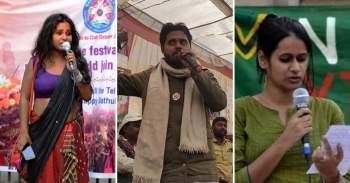
.png) Joseph Maliakan
Joseph Maliakan

Are we slowly but steadily converting our academic institutions into prisons? Two recent incidents -- one at the Kolhapur Institute of Technology's College of Engineering in Maharashtra and the other at the prestigious Indian Institute of Science (IISc), Bangalore -- should be a wakeup call to the entire student-teacher community in the country.
On June 27, the administration of the IISc without assigning any reason abruptly cancelled a discussion on “Unlawful Activities Prevention Act (UAPA), Prisons and Criminal Justice System” that was to be led by student activists Natasha Narwal and Devangana Kalita the very next day.
Narwal and Kalita were arrested in May 2020 for their alleged role in the North-East Delhi riots conspiracy case and charged under the UAPA. A year after their incarceration in Tihar Jail, the Delhi High Court had granted them bail. The High Court, in its bail order, had pointed out: “It seems that in its anxiety to suppress dissent, in the mind of the state, the line between the constitutionally guaranteed right to protest and terrorist activity seems to be getting somewhat blurred.”
In a letter addressed to the Director of the IISc, more than 500 academics and students have protested against the arbitrary action of the administration and demanded that freedom of ex
Following the cancellation of the discussion, Shairik Sengupta, one of the student organisers of the event and a member of the ‘Break the Silence’ group at the IISc, told the Indian Express (July 4) that such intervention by the Registrar (Sridhar Warrier) is very unusual because students required permission only from the Department to hold any discussion. In the present case, the discussion was to be held at the Department of Continuing Education and students had the required permission from the Head of the Department.
After the cancellation of the event, the organisers informally met outside the Sarvam Complex of the institute but the administration sent a security team to disperse the gathering. It was only after some members of the IISc Faculty intervened the security team returned.
Suvrat Raju, a faculty member of the International Centre for Theoretical Sciences (ICTS) of Tata Institute of Fundamental Research, who was present at the informal discussion told the Indian Express, “This is the height of paranoia since an academic institution should be a place where people can really talk and discuss different things."
The letter to the Director also pointed out that the cancellation of the discussion has marred the reputation of the IISc nationally and internationally. “We hope that you will take urgent corrective measures and ensure that members of the IISc remain free to express and discuss a range of ideas, both about science and about the society that we live in,” the letter concluded.
Kolhapur was still recovering from incidents of communal violence that broke out after some one made Aurangazeb's image the status of their social media account when Teaswini Desai, an Associate Professor of Physics at the Kolhapur Institute of Technology's College of Engineering, agreed to take class on human values in early June. It was not her regular class. She was taking over from another teacher who had resigned. The students informed her that they have been discussing the idea of discrimination and would like to continue with the same subject.
Professor Desai suggested gender discrimination. But the students insisted to discuss religious discrimination instead. She agreed to their suggestion. During the discussion, some students reiterated prejudices and false claims against Muslims.They claimed that Muslims are generally violent and rapists and they obstruct Hindu festivals. They also maintained that the Babri Masjid was demolished on the orders of the Supreme Court.
Professor Desai was shocked and responded by saying that rape is a crime that is being committed by men of all religions including Patil and Deshmukh communities, prominent groups in Maharashtra. Unknown to Professor Desai, some students recorded the classroom discussion.
A week after the discussion, Professor Desai was called to the Principal's office where a police officer was present. She was informed that an edited version of the discussion was circulating on various social media platforms. The video alleged that she had described Aurangzeb as a good man and called Patils and Deshmukhs rapists. She was shocked to learn that her comments were completely distorted.
The police claimed that they had seen the social media exchanges and had come to the college to question her. The college administration asked Professor Desai to resolve the matter by apologising, but she refused.
Now a committee has been set up by the college to inquire into the conduct of professor Desai and she has been asked to go on leave till the committee submits report. In this incident, it is not Professor Desai but the students who have violated the sanctity of the classroom discussion. The classroom is not a public space, it is purely private and all discussions in the classroom should have remained private.That is why no teacher ever discloses the identity of any student whatever mistakes he or she makes.